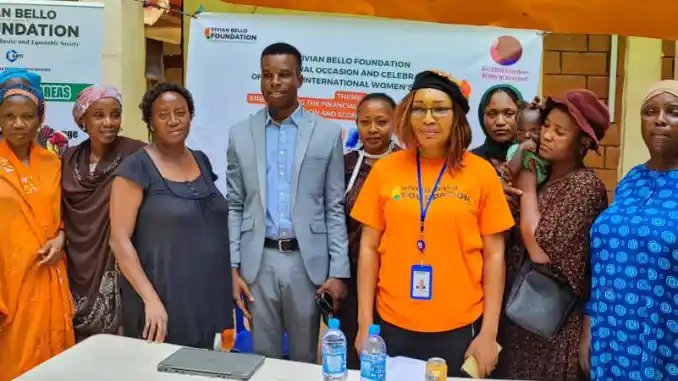With the help of a non-profit organization called the Vivian Bello Foundation and Girl-Child Freedom at the Grassroots (GCFG), the empowerment of small-scale women entrepreneurs in Nigeria through digital financial literacy has begun.
The empowerment program, which was held on Thursday at Dutse Market in Dutse, Abuja, was created to address the problems that the CBN’s monetary policy had caused for small-scale female traders in the Federal Capital Territory (FCT) and throughout Nigeria.
The Foundation’s first program, with the theme “Strengthening the Financial Digital Access of Women for Inclusion and Economic Empowerment,” is aimed at small-scale women entrepreneurs. It also includes digital financial literacy training.
In her remarks to the attendees, Ms. Vivian Bellonwu, the founder and CEO of the Vivian Bello Foundation, lamented that Nigerian women, particularly small-scale traders, had been adversely affected by the Central Bank of Nigeria’s (CBN) cashless policy. She noted that while entities that interact with the economy on a larger scale do not appear to have many issues, those on a smaller scale have had difficulty with the policy and its operationalization.
The theme of this year’s IWD, “DigitAll, Innovation and Technology for Gender Equality,” according to Bellonwu, essentially addresses a crucial issue by integrating women with contemporary digital innovations.
Read Also: Benue Sons of a deceased mother rejected, threw away casket brought by son in-law
She pointed out that about 65% of women in Nigeria lack access to a cost-effective and dependable internet connection, noting that this contributes to digital illiteracy and excludes women from this sector of the economy.
She said, “This has been one area where Africa and Nigeria, in particular, have fared weakly, the foundation for this being the internet where approximately 65% of women in Nigeria do not have access to an affordable and dependable internet connection. This contributes to the exclusion of women from this sector of the economy and to digital illiteracy.
“Therefore, it was not surprising that the majority of people were affected, and women were particularly hard hit, especially those in lower-paying trades and the arts when the Central Bank of Nigeria announced the sudden new monetary policies in Nigeria to usher in a nearly entirely cashless economy. Many of these groups of women lacked functional bank accounts and operations as well as adequate knowledge and comprehension of the digital processes supporting the cashless policy required by Apex bank. As a result, they were plunged into a maze of confusion as well as hardship as many people observed how customers dwindled and business drastically decreased.
“In order to stay afloat, many turned to making do or channeling their transactions and inflows to any available person who has knowledge of the digital process and possibly also has the devices. Undoubtedly, they made a fortune off of these women who were forced to pay outrageous fees or risk losing sales. They naturally accept it since they essentially have no other option. It is well known that Nigeria is one of the top seven nations in the world for having a large unbanked population. Over 64 million, according to the FINDEX Report 2021 of the World Bank. 200 million people in Nigeria have no accounts with banks or other financial institutions or with mobile payment systems.
“Over the months that the cashless policies have been in effect, the economic capacities of women have been seriously hampered due to drastically reduced economic activities, which has had a negative impact on families and children who depend on the income from these women’s ventures for a living and survival.
The Vivian Bello Foundation and its partner, Girl-Child Freedom at Grassroots (GCFG), are organizations that are focused on issues that promote and protect gender rights and social inclusion of vulnerable populations. After conducting assessments and identifying these challenges to women in the cashless policy, they set out to collaborate with relevant institutions (like we have here today, FINTECHS, etc.), in order to address these challenges for women.
“This is crucial right now because, despite the fact that the cash crunch appears to be getting a little better, we must not lose sight of the fact that the policy is still in effect and will soon resume in full force. Furthermore, it is crucial that we do everything in our power to fully engage women in digital financing because the world as a whole is moving away from analog financial processes, making it imperative for women to do so.
“We are therefore extremely happy to have digital financial institutions like Opay and Wired Banking Africa on board with this program, as they have rightly embraced the idea of promoting women’s inclusion in the digital financial process.
“We do, in fact, thank them, and we hope that they will stay involved in this process as they are equally important in assisting the general populace in assimilating the cashless system. They will have the chance to engage with our women (and men, too), interact with them, and walk them through some of the channels, platforms, avenues, devices, and methods that will enable them to go completely cashless, be active, and conduct their businesses without too many problems.
Fintechs have become very important and reliable players in Nigeria’s economy, and just recently, Godwin Emefiele, governor of the Central Bank of Nigeria, singled them out and praised them for facilitating easy transactions for Nigerians and their contribution to relieving pressure on traditional banks.
Bellonwu expressed confidence that all Nigerian women would quickly become accustomed to and integrated into digital financial processes, allowing them to conduct business freely and easily.
Since this is the Foundation’s first event, I would like to once again extend a warm welcome to everyone in attendance. Despite the fact that this is the Foundation’s first event, we will continue to work with all of the great organizations present to find solutions to any problems or challenges that may face women.
I therefore urge you to feel free to speak with them (in the language you know how to speak), share your challenges and issues, etc. It is my hope that in no distant time, all women in this Dutse market and indeed across other places will be well integrated into and acquainted with digital financial processes and will be transacting their businesses freely and easily.
Nwaiwu Chinonso, the executive director of the Global Center for Financial Gender, also spoke during the event and disclosed that the GCFG has empowered over 10,000 women and girls in Nigeria through digital cash transfers for low-income women.
When compensation is tailored to a woman’s needs, he said, a woman’s work changes. has the potential to influence the economy and the chance to end hunger and poverty.
“Our Girl-Child is the future mother,” he declared. “GCFG has empowered more than 10,000 women and girls in Nigeria through digital cash transfers for low-income women.” When a woman receives payment that is tailored to her needs, digitalized, and sent to her own account, her work is changed. Women now have the ability to participate in the economy and have the chance to escape the cycle of hunger and poverty thanks to digital financial inclusion. Families and societies as a whole can prosper once women have economic power.
The ability to access financial services provided by digital technologies requires certain knowledge, abilities, behaviors, and understandings. Digitally and financially capable women can assess, select, and use financial services that can improve their lives. Building women’s capabilities requires an iterative and gradual process due to the complexity of digital financial capability, which cannot be accomplished in a single step.
Read Also: After Losing Abia State to Labour Party, Ikpeazu transfers aggression and fires several of his aides
“Market women have experienced a great deal of difficulty during the cash crunch, loss of goods, poverty, hunger, and loss of lives.”
The event’s highlight was the Fintechs’ sensitization and training of the women on digital finance processes.
A non-governmental organization (NGO), the Vivian Bello Foundation works to end social and gender inequality in society by partnering with other NGOs and institutions.
Join Television Nigerian Whatsapp Now
Join Television Nigerian Facebook Now
Join Television Nigerian Twitter Now
Join Television Nigerian YouTUbe Now





